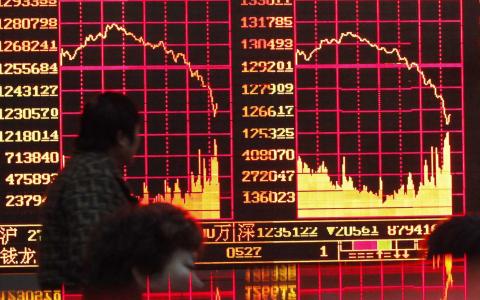
(CNN) Nothing is free, not even free trading. That point was driven home by "failures" uncovered by regulators at zero-commission trading app Robinhood.
FINRA, Wall Street's self-regulator, fined Robinhood $1.25 million Thursday for sending customer trading orders to four broker-dealers without guaranteeing the best price.
Those broker-dealers -- probably market makers such as high-frequency trading firms -- paid Robinhood for executing the trades with them, FINRA said. That controversial industry practice is known as payment for order flow.
Just as Facebook makes money by selling user information to advertisers, brokerage firms can cash in on where they send customer trade orders.
FINRA said these "best execution violations" took place between October 2016 and November 2017, but the regulator did not provide any details on how much harm, if any, customers may have suffered.
The $1.25 million fine is a slap on the wrist for Robinhood, which caters to Millennials and new investors and is valued at nearly $9 billion. But the sanctions are a blow to the reputation of a startup that has revolutionized the trading industry. Robinhood's rapid rise -- the app sports more than 10 million users -- recently led established players to abolish commissions and even sparked the blockbuster merger of Charles Schwab and TD Ameritrade.
In a statement, Robinhood said the settlement does not "reflect our practices or procedures today."
"Over the last two years, we have significantly improved our execution monitoring tools and processes relating to best execution, and we have established relationships with additional market makers," the company said.
FINRA calls out Robinhood
The sanctions shine a bright light on the controversial practice of sending retail trade orders to high-speed market makers that can profit off that lucrative information.
Although individual trades aren't particularly valuable to high-frequency traders, millions of transactions in the aggregate give computers information they otherwise wouldn't see.
"Market makers are paying for it because they want the intel. They want to trade against the 'dumb flow," said Joe Saluzzi, co-head of trading at brokerage firm Themis Trading. "They consider retail dumb. The more they see, the better chance they can determine which way the market is going."
He added that "technically, there is nothing wrong with it because it's allowed by the SEC." Saluzzi is also the author of "Broken Markets: How High Frequency Trading and Predatory Practices on Wall Street are Destroying Investor Confidence and Your Portfolio."
FINRA rules require firms that route away orders to ensure customers are getting the best execution by conducting a "regular and rigorous review."
FINRA said that Robinhood did not "reasonably consider" factors such as "price improvement" that it could obtain from alternative markets.
In other words, Robinhood may not have been holding up its obligation to make sure those Amazon shares you sold on the app got the fairest price.
Robinhood "focused only on the execution quality of its pre-existing routing destinations, all of which paid Robinhood for that order flow," FINRA said.
Vlad Tenev, Robinhood's co-CEO, has defended the practice of payment for order flow.
"Rebates from market makers and trading revenues are one of the ways that Robinhood makes money," Tenev told CNN Business last week. "It's how the market works in the US. It's a common practice that is pretty much ubiquitous."
Tenev stressed that Robinhood systematically reviews the performance of market makers, including by looking at the speed and price offered to customers. "We automatically send orders to the market maker most likely to provide the best execution," he said.
Robinhood's order flow revenue is soaring
Yet FINRA said that Robinhood did not perform systematic best execution reviews of several order types, such as ones received outside regular trading hours. That meant that "hundreds of thousands of orders each month" fell outside Robinhood's review process, FINRA said.
And FINRA said that Robinhood's supervisory system was "not reasonably designed" to achieve compliance with its best execution obligations. For instance, the regulator said the system disregarded several order types and factors.
As part of the settlement, Robinhood agreed to hire an independent consultant to conduct a comprehensive review of its systems and procedures. FINRA said that Robinhood neither admitted nor denied the charges, but consented to the entry of the agency's findings.
Robinhood raised nearly $400 million in October in a deal that valued the startup at $8.8 billion, according to PitchBook.
One factor behind its soaring valuation: Robinhood's revenue from selling customer trades to high-frequency traders appears to be surging. Robinhood's estimated order flow revenue spiked 227% in 2018 to $69 million, according to a recent report by Alphacution Research.
Robinhood routes much of its orders to electronic market makers that engage in high-frequency trading. For instance, Robinhood said in regulatory filings it sent 40% of its orders of NYSE-listed securities during the third quarter to Citadel Securities, the market maker founded by billionaire Ken Griffin.
Other leading destinations include Two Sigma Securities and Virtu Americas, the filings said.
Robinhood said that it received payment for these order flows -- although those payments often amounted to just fractions of a penny per share. Robinhood said payments from Citadel averaged less than $0.00026 per dollar of executed trade value.
It's a reminder of the cost of free trading.
"There's never been a better time to be an investor," Phil Bak, CEO of Exponential ETFs, recently told CNN Business.
However, he compared the free trading business model to Facebook's, where users may not realize their personal information is being sold to advertisers.
"There is going to be increasing power to high-frequency traders that are buying the order flow," Bak said. "Those are fees that investors are paying that are kind of hidden now. It looks like zero-fee. It's not exactly zero-fee."



